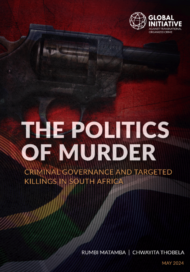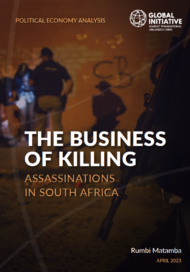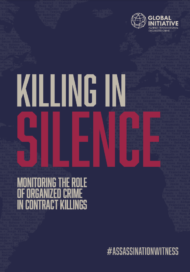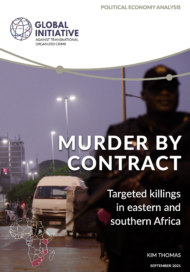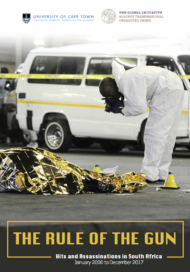Posted on 20 May 2024
The GI-TOC, through its South Africa Observatory (SA-Obs), has recorded at least 10 politically-related assassinations between January and April 2024. This contrasts with 31 political assassinations recorded across 2023. Politically-related assassinations, which we define as killings targeted at individuals holding a political or administrative position, whistleblowers, and political activists, have a particularly detrimental impact on governance and democracy. These murders are used to silence political opponents, take control of succession battles, infiltrate local governance and influence political outcomes.
Over the past decade, the GI-TOC has documented a staggering 108% increase in targeted killings in South Africa. While South Africa has long grappled with high levels of violence, as evidenced by a per capita murder rate of 45 per 100,000 in 2022/23, or approximately 70 murders a day, targeted killings have notably escalated, particularly political killings at local municipal level. Hitmen have become more daring, incidents more public and victims more high-profile. Coupled with the deficiencies in South Africa’s overburdened criminal justice system, where only about 15% of all murders are solved, the picture that emerges is one of a situation that is barely contained.
GI-TOC recorded 131 targeted killings in South Africa in 2023, just ten fewer than in 2022. The 131 cases were grouped into four categories: organized-crime related (46 cases or 35% of incidents), minibus taxi-industry related (45 incidents, or 34%), political assassinations (31 incidents, or nearly 24%) and personal assassinations (9 incidents, or nearly 7%). While every effort is made to ensure that the data is robust and accurate, this is almost certainly an undercount as the database draws on publicly available information such as press reports, media statements from affected families, court records, and media statements by the criminal justice sector.
This report is framed in the context of South Africa’s 2024 general elections. Previous analysis has shown that there are always spikes in political assassinations during election years, particularly in long-contested provinces such as KwaZulu-Natal. The 2024 elections, the sixth national election in the country’s 30 years of democracy, have been earmarked as a potential watershed moment.
Political violence and assassinations pose a very real threat to the country’s democracy. They are not an isolated phenomenon and they intersect with organized crime and criminal networks. The intertwining of criminal networks and political assassinations in South Africa underscores the urgent need for comprehensive strategies to tackle organized crime and stop targeted killings.
Correction
This report, published on 20 May 2024, incorrectly stated in a timeline on page 14 that OR Tambo Municipality Speaker, Xolile Nkompela, was killed in a hit in October 2021. In fact, Nkompela survived the assassination attempt unharmed. Nkompela had previously survived an earlier attack in December 2015, during which his bodyguard, Zukile Nyontso, was killed. Reporting on the 2021 incident, the Daily Dispatch quoted a municipal chief of staff as saying: ‘Nkompela escaped the ordeal unharmed as he defended himself against this foiled attempt to assassinate him.’ The error came to light during proceedings on 21 October 2025 of an ad hoc parliamentary committee into Lieutenant General Nhlanhla Mkhwanazi’s allegations. The Global Initiative Against Transnational Organized Crime promptly investigated and has corrected the report. (Our database of political killings correctly reflects that Nkompela survived.) We sincerely apologize for the error.
